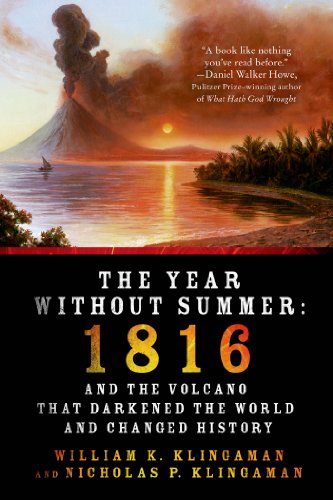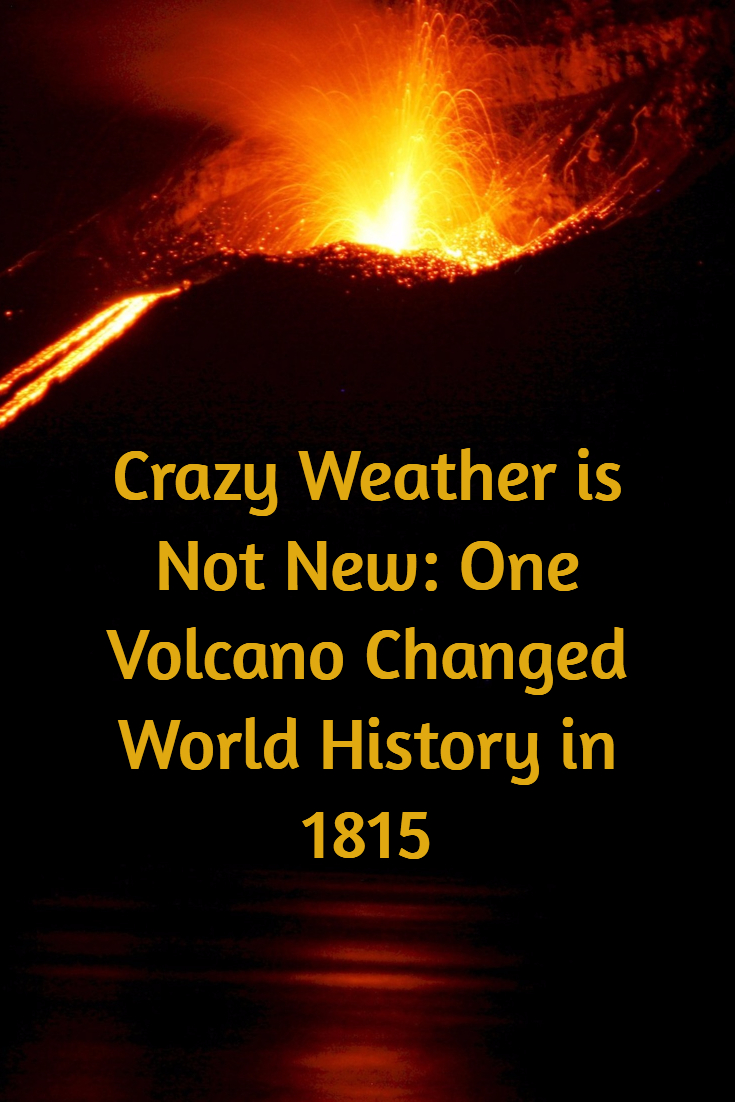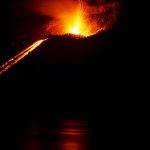Crazy Weather Is Not New: Tales and Tragedies of 1816
In April of 1815, an Asian volcano blew its top. Mount Tambora, on an Indonesian island, let loose with explosions that sounded like cannons to Stamford Raffles, the Lieutenant-Governor of Java 800 miles away. The immediate results killed thousands of people in the area around the volcano. This was just over 200 years ago and word did not spread quickly around the planet. It was months before word reached the United States, and Americans had no idea what drastic effects the event would have on their lives. In fact, they would never know what hit them. It would be over 100 years before scientists figured out that the eruption caused their very strange weather.
Then 1816 became the year without a summer. What the volcano spewed into the air spread all over the world. The haze kept the sunlight from reaching the earth in a normal way. In many places, the summer of 2016 was wet, cold, and winter-like:
There has not been this whole summer one day of steady sunshine, not one day of heat, nor one night when a coverlet and blanket could have been thrown off with comfort. — an observer in London, August 1816
In other places, there was drought for months at a stretch, accompanied in some places by far-reaching forest fires. The book I’ve just read says, “The meticulously observant Thomas Jefferson measured only 0.8 inches of rain at Monticello [his home in Virginia], as opposed to the monthly average of 9.2 inches.”
Another bit from the book captures the mood of the time: “the summer’s sense of impending apocalypse, the fears of a dying sun, the frigid atmosphere, the approaching and inevitable famine, and the desolation of mockery and faith as prayers went unanswered.”
So what’s the book? It’s The Year Without Summer: 1816 and the Volcano that Darkened the World and Changed History, by the father-and-son team of historian William Klingaman and climate scientist Nicholas Klingaman, published in 2013. Clicking on the title or the book cover image will take you to the book’s page at Amazon.com.

The writers chiefly discuss various places in the United States and in Europe, as those were areas where the historical data is abundant, but the haze in the stratosphere went everywhere. Crops were greatly diminished if not destroyed entirely, and as the quote above mentions, there was great fear of famine ahead. Realistically, too… later in the summer and into the winter and the next year, what wheat, corn, barley, rye, and other crops that could be found were usually of poor quality and very expensive. Oats came through a bit better, and many a family survived due to oats.
Poor people 200 years ago were living on the brink anyway, and indeed many thousands did starve or die of diseases that their weakened bodies couldn’t fight off. The book goes into that and also on the effects on history. Thousands of people emigrated from New England to Ohio, Indiana, and other places in what we now call the Midwest but what was then called the West. Governments responded to the plight of the poor in a variety of ways in different countries. Most of the responses do not speak of human kindness. But it’s all part of history. If you want to find out more without reading a whole book, see the Wikipedia article on the year without a summer.
I got this book out of my public library and I didn’t expect it to be as compelling as it was. At first, it wasn’t but as the impending famine became more evident, I was gripped. I was relieved that some regions were not as bad as others.
I was reminded of a book that I read as a teenager and enjoyed sharing with people when I was a librarian. Here I Stay, by Elizabeth Coatsworth, is a novel that reads like a true story, about the decision a young woman makes in 1816 or 1817. A good read!
I’m not writing about these books because you or I need a history lesson as such. What strikes me is the relevance to now. Not just volcanic eruptions, but how the world can change so quickly. And how there are things we can easily do now that could suddenly be too late.
One could make the argument from The Year Without Summer that climate disasters don’t have to be caused by industrialization. Sure, that’s true. What I think is important is a little different, though… it’s what I just put in bold.
If you are on Pinterest, here is an image ready for pinning:


